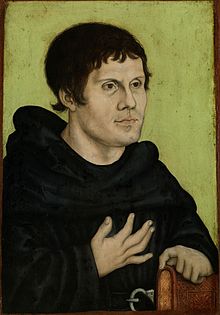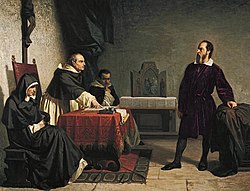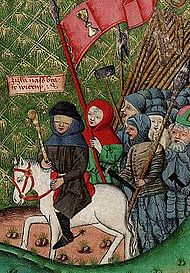The Gospel (allegory) triumphs over Heresia and the Serpent. Gustaf Vasa Church, Stockholm, Sweden, sculpture by Burchard Precht.
The burning of the pantheistic Amalrician heretics in 1210, in the presence of King Philip II Augustus. In the background is the Gibbet of Montfaucon and, anachronistically, the Grosse Tour of the Temple. Illumination from the Grandes Chroniques de France, c. 1455–1460.
Heresy is any belief or theory that is strongly at variance with established beliefs or customs, in particular the accepted beliefs of a church or religious organization. The term is usually used in reference to violations of important religious teachings, but is also used of views strongly opposed to any generally accepted ideas. A heretic is a proponent of heresy.
The term is used particularly in reference to Christianity, Judaism, and/or Islam.
In certain historical Christian, Muslim and Jewish cultures, among
others, espousing ideas deemed heretical has been (and in some cases
still is) met with censure ranging from excommunication to the death penalty.
Heresy is distinct from apostasy, which is the explicit renunciation of one's religion, principles or cause; and from blasphemy, which is an impious utterance or action concerning God or sacred things. Heresiology is the study of heresy.
Etymology
Derived from Ancient Greek haíresis (αἵρεσις), the English heresy originally meant 'choice' or 'thing chosen'. However, it came to mean the "party, or school, of a man's choice," and also referred to that process whereby a young person would examine various philosophies to determine how to live.
The word heresy is usually used within a Christian,
Jewish, or Islamic context, and implies slightly different meanings in
each. The founder or leader of a heretical movement is called a heresiarch, while individuals who espouse heresy or commit heresy are known as heretics.
Christianity
Former German Catholic friar Martin Luther was famously excommunicated as a heretic by Pope Leo X by his Papal bull Decet Romanum Pontificem in 1520. To this day, the Papal decree has not been rescinded.
According to Titus 3:10
a divisive person should be warned twice before separating from him.
The Greek for the phrase "divisive person" became a technical term in
the early Church for a type of "heretic" who promoted dissension.
In contrast, correct teaching is called sound not only because it
builds up the faith, but because it protects it against the corrupting
influence of false teachers.
The Church Fathers identified Jews and Judaism with heresy. They saw deviations from orthodox Christianity as heresies that were essentially Jewish in spirit. Tertullian
implied that it was the Jews who most inspired heresy in Christianity:
"From the Jew the heretic has accepted guidance in this discussion [that
Jesus was not the Christ]."
The use of the word heresy was given wide currency by Irenaeus in his 2nd century tract Contra Haereses (Against Heresies)
to describe and discredit his opponents during the early centuries of
the Christian community. He described the community's beliefs and
doctrines as orthodox (from ὀρθός, orthos, 'straight' + δόξα, doxa, 'belief') and the Gnostics' teachings as heretical. He also pointed out the concept of apostolic succession to support his arguments.
Constantine the Great, who along with Licinius had decreed toleration of Christianity in the Roman Empire by what is commonly called the "Edict of Milan", and was the first Roman Emperor baptized, set precedents for later policy. By Roman law the Emperor was Pontifex Maximus, the high priest of the College of Pontiffs (Collegium Pontificum) of all recognized religions in ancient Rome. To put an end to the doctrinal debate initiated by Arius, Constantine called the first of what would afterwards be called the ecumenical councils and then enforced orthodoxy by Imperial authority.
The first known usage of the term in a legal context was in AD 380 by the Edict of Thessalonica of Theodosius I, which made Christianity the state church of the Roman Empire.
Prior to the issuance of this edict, the Church had no state-sponsored
support for any particular legal mechanism to counter what it perceived
as "heresy". By this edict the state's authority and that of the Church
became somewhat overlapping. One of the outcomes of this blurring of
Church and state was the sharing of state powers of legal enforcement
with church authorities. This reinforcement of the Church's authority
gave church leaders the power to, in effect, pronounce the death
sentence upon those whom the church considered heretical.
Within six years of the official criminalization of heresy by the Emperor, the first Christian heretic to be executed, Priscillian, was condemned in 386 by Roman secular officials for sorcery, and put to death with four or five followers. However, his accusers were excommunicated both by Ambrose of Milan and Pope Siricius, who opposed Priscillian's heresy, but "believed capital punishment to be inappropriate at best and usually unequivocally evil." The edict of Theodosius II (435) provided severe punishments for those who had or spread writings of Nestorius. Those who possessed writings of Arius were sentenced to death.
For some years after the Reformation,
Protestant churches were also known to execute those they considered
heretics, including Catholics. The last known heretic executed by
sentence of the Catholic Church was Spanish schoolmaster Cayetano Ripoll in 1826. The number of people executed as heretics under the authority of the various "ecclesiastical authorities" is not known.
Catholicism
Massacre of the Waldensians of Mérindol in 1545.
In the Catholic Church, obstinate and willful manifest heresy is considered to spiritually cut one off from the Church, even before excommunication is incurred. The Codex Justinianus (1:5:12) defines "everyone who is not devoted to the Catholic Church and to our Orthodox holy Faith" a heretic.
The Church had always dealt harshly with strands of Christianity that
it considered heretical, but before the 11th century these tended to
centre on individual preachers or small localised sects, like Arianism, Pelagianism, Donatism, Marcionism and Montanism. The diffusion of the almost Manichaean sect of Paulicians westwards gave birth to the famous 11th and 12th century heresies of Western Europe. The first one was that of Bogomils
in modern-day Bulgaria, a sort of sanctuary between Eastern and Western
Christianity. By the 11th century, more organised groups such as the Patarini, the Dulcinians, the Waldensians and the Cathars were beginning to appear in the towns and cities of northern Italy, southern France and Flanders.
In France the Cathars grew to represent a popular mass movement and the belief was spreading to other areas. The Cathar Crusade was initiated by the Catholic Church to eliminate the Cathar heresy in Languedoc. Heresy was a major justification for the Inquisition (Inquisitio Haereticae Pravitatis, Inquiry on Heretical Perversity) and for the European wars of religion associated with the Protestant Reformation.
Cristiano Banti's 1857 painting Galileo facing the Roman Inquisition.
Galileo Galilei was brought before the Inquisition for heresy, but abjured his views and was sentenced to house arrest,
under which he spent the rest of his life. Galileo was found
"vehemently suspect of heresy", namely of having held the opinions that
the Sun lies motionless at the centre of the universe,
and that the Earth is not at its centre and moves, and that one may
hold and defend an opinion as probable after it has been declared
contrary to Holy Scripture. He was required to "abjure, curse and
detest" those opinions.
Pope Gregory I stigmatized Judaism and the Jewish people in many of his writings. He described Jews as enemies of Christ: "The more the Holy Spirit
fills the world, the more perverse hatred dominates the souls of the
Jews." He labeled all heresy as "Jewish", claiming that Judaism would
"pollute [Catholics and] deceive them with sacrilegious seduction." The identification of Jews and heretics in particular occurred several times in Roman-Christian law.
Eastern Orthodox Church
In Eastern Orthodox Christianity heresy most commonly refers to those beliefs declared heretical by the first seven Ecumenical Councils. Since the Great Schism and the Protestant Reformation,
various Christian churches have also used the concept in proceedings
against individuals and groups those churches deemed heretical.
The Orthodox Church also rejects the early Christian heresies such as Arianism, Gnosticism, Origenism, Montanism, Judaizers, Marcionism, Docetism, Adoptionism, Nestorianism, Monophysitism, Monothelitism and Iconoclasm.
Protestantism
In his work "On the Jews and Their Lies" (1543), German Reformation leader Martin Luther claims that Jewish history was "assailed by much heresy", and that Christ the logos swept away the Jewish heresy and goes on to do so, "as it still does daily before our eyes." He stigmatizes Jewish prayer
as being "blasphemous" and a lie, and vilifies Jews in general as being
spiritually "blind" and "surely possessed by all devils."
In England, the 16th-century European Reformation resulted in a
number of executions on charges of heresy. During the thirty-eight years
of Henry VIII's
reign, about sixty heretics, mainly Protestants, were executed and a
rather greater number of Catholics lost their lives on grounds of
political offences such as treason, notably Sir Thomas More and Cardinal John Fisher, for refusing to accept the king's supremacy over the Church in England. Under Edward VI, the heresy laws were repealed in 1547 only to be reintroduced in 1554 by Mary I;
even so two radicals were executed in Edward's reign (one for denying
the reality of the incarnation, the other for denying Christ's
divinity).
Under Mary, around two hundred and ninety people were burned at the
stake between 1555 and 1558 after the restoration of papal jurisdiction. When Elizabeth I came to the throne, the concept of heresy was retained in theory but severely restricted by the 1559 Act of Supremacy
and the one hundred and eighty or so Catholics who were executed in the
forty-five years of her reign were put to death because they were
considered members of "a subversive fifth column." The last execution of a "heretic" in England occurred under James VI and I in 1612.
Although the charge was technically one of "blasphemy" there was one
later execution in Scotland (still at that date an entirely independent
kingdom) when in 1697 Thomas Aikenhead was accused, among other things, of denying the doctrine of the Trinity.
Another example of the persecution of heretics under Protestant rule was the execution of the Boston martyrs in 1659, 1660, and 1661. These executions resulted from the actions of the Anglican Puritans, who at that time wielded political as well as ecclesiastic control in the Massachusetts Bay Colony.
At the time, the colony leaders were apparently hoping to achieve their
vision of a "purer absolute theocracy" within their colony.[citation needed]
As such, they perceived the teachings and practices of the rival Quaker
sect as heretical, even to the point where laws were passed and
executions were performed with the aim of ridding their colony of such
perceived "heresies."
Modern era
The trial and subsequent execution of heretics under the banner of
Christianity came to an end in 1826 with the last execution of a
"heretic," Cayetano Ripoll, by the Spanish Inquisition.
Although less common than in earlier periods, in modern times,
formal charges of heresy within Christian churches still occur. Issues
in the Protestant churches have included modern biblical criticism and
the nature of God. In the Catholic Church, the Congregation for the Doctrine of the Faith criticizes writings for "ambiguities and errors" without using the word "heresy."
Perhaps due to the many modern negative connotations associated with the term heretic,
such as the Spanish inquisition, the term is used less often today. The
subject of Christian heresy opens up broader questions as to who has a
monopoly on spiritual truth, as explored by Jorge Luis Borges in the short story "The Theologians" within the compilation Labyrinths.
On 11 July 2007, Pope Benedict XVI stated that some Protestant groups are "ecclesial communities" rather than Churches. Representatives of some of these Christian denominations accused the Vatican of effectively calling them heretics.
However, Pope Benedict XVI clarified that the phrase "ecclesial
community" did not necessitate explicit heresy, but only that the
communities lacked certain "essential elements" of an apostolic church,
as he had written in the document Dominus Iesus.
Islam
Starting in medieval times, Muslims began to refer to heretics and those who antagonized Islam as zindiqs, the charge being punishable by death.
Ottoman Sultan Selim the Grim, regarded the Shia Qizilbash as heretics, reportedly proclaimed that "the killing of one Shiite had as much otherworldly reward as killing 70 Christians." Shia, in general, have often been accused by Sunnis of being heretics.
In some modern day nations and regions, heresy remains an offense punishable by death. One example is the 1989 fatwa issued by the government of Iran, offering a substantial bounty for anyone who succeeds in the assassination of author Salman Rushdie, whose writings were declared as heretical. Moreover, the Baha'i Faith is considered an Islamic heresy in Iran.
Judaism
Orthodox Judaism considers views on the part of Jews who depart from traditional Jewish principles of faith heretical. In addition, the more right-wing groups within Orthodox Judaism hold that all Jews who reject the simple meaning of Maimonides's 13 principles of Jewish faith are heretics. As such, most of Orthodox Judaism considers Reform and Reconstructionist Judaism heretical movements, and regards most of Conservative Judaism as heretical. The liberal wing of Modern Orthodoxy
is more tolerant of Conservative Judaism, particularly its right wing,
as there is some theological and practical overlap between these groups.
Other religions
The act of using Church of Scientology techniques in a form different than originally described by L. Ron Hubbard is referred to within Scientology as "squirreling" and is said by Scientologists to be high treason. The Religious Technology Center has prosecuted breakaway groups that have practiced Scientology outside the official Church without authorization.
Although Zoroastrianism has had an historical tolerance for other religions, it also held sects like Zurvanism and Mazdakism
heretical to its main dogma and has violently persecuted them, such as
burying Mazdakians with their feet upright as "human gardens." In later
periods Zoroastrians cooperated with Muslims to kill other Zoroastrians
deemed as heretical.
Neo-Confucian heresy has been described.
Non-religious usage
In other contexts the term does not necessarily have pejorative
overtones and may even be complimentary when used, in areas where
innovation is welcome, of ideas that are in fundamental disagreement
with the status quo in any practice and branch of knowledge.
Scientist/author Isaac Asimov considered heresy as an abstraction, mentioning religious, political, socioeconomic and scientific heresies. He divided scientific heretics into: endoheretics, those from within the scientific community; and exoheretics, those from without. Characteristics were ascribed to both and examples
of both kinds were offered. Asimov concluded that science orthodoxy
defends itself well against endoheretics (by control of science
education, grants and publication as examples), but is nearly powerless
against exoheretics. He acknowledged by examples that heresy has
repeatedly become orthodoxy.
Publishing his findings as The Dinosaur Heresies, revisionist paleontologist Robert T. Bakker, himself a scientific endoheretic, treated the mainstream view of dinosaurs as dogma:
I have enormous respect for dinosaur paleontologists past and present. But on average, for the last fifty years, the field hasn't tested dinosaur orthodoxy severely enough.
He
adds that, "Most taxonomists, however, have viewed such new terminology
as dangerously destabilizing to the traditional and well-known scheme." The illustrations by the author show dinosaurs in very active poses, in contrast to the traditional perception of lethargy.
Immanuel Velikovsky is an example of a recent scientific exoheretic; he did not have appropriate scientific credentials or did not publish in scientific journals. While the details of his work are in scientific disrepute, the concept of catastrophic change (extinction event and punctuated equilibrium) has gained acceptance in recent decades.
The term heresy is used not only with regard to religion but also in the context of political theory. The term heresy is also used as an ideological pigeonhole for contemporary writers because, by definition, heresy depends on contrasts with an established orthodoxy. For example, the tongue-in-cheek contemporary usage of heresy, such as to categorize a "Wall Street heresy" a "Democratic heresy" or a "Republican heresy," are metaphors that invariably retain a subtext that links orthodoxies in geology or biology
or any other field to religion. These expanded metaphoric senses allude
to both the difference between the person's views and the mainstream
and the boldness of such a person in propounding these views.










